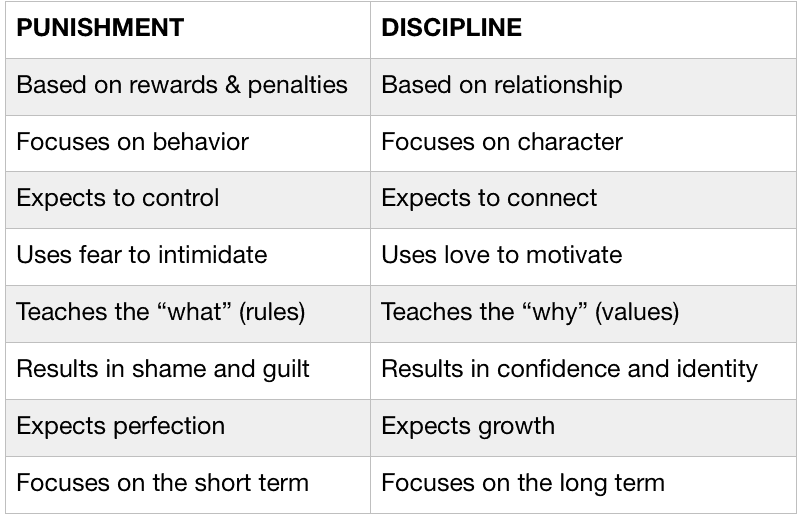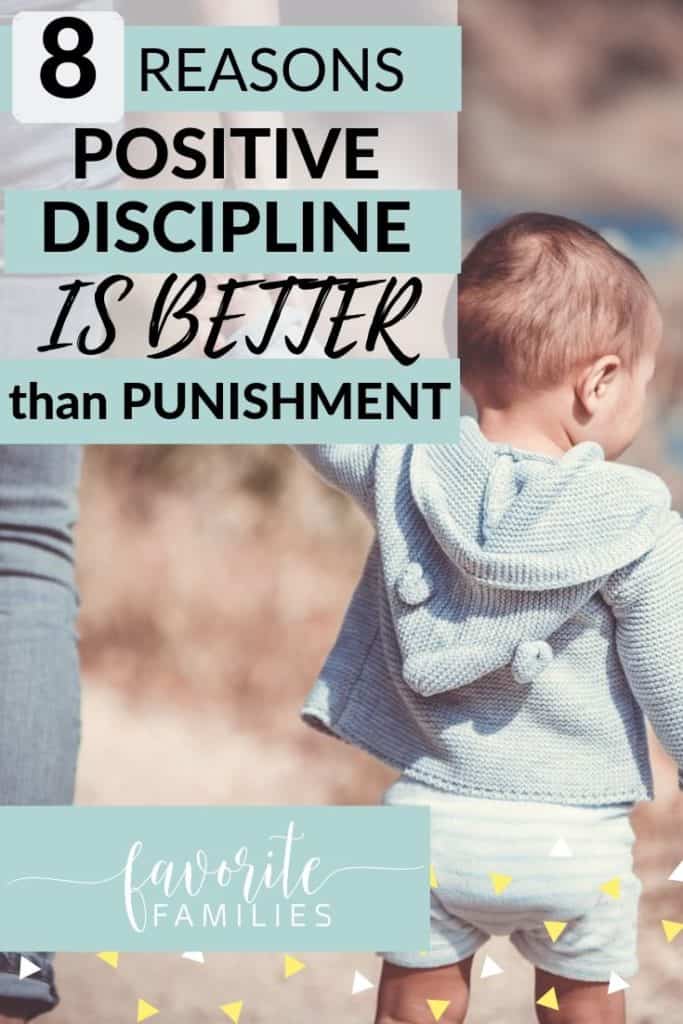
Wouldn’t it be great if we never had to punish our kids? One of the most frequent questions I’m asked by parents is how to effectively discipline their kids.
You don’t have to be a parent for very long to realize something: you can’t actually control your kids. No matter how intimidating or kind or threatening or strategic you are, you ultimately cannot 100% control your child. And honestly? It’s time to stop trying.
[This is Part 2 in a Series! If you want to read more on this topic, check out Part 1: 3 Essential Elements of Positive Discipline]
What? I shouldn’t control my child’s behavior? What do you mean?
There’s this idea out there that a parent’s job is to control their child’s behavior. Not only is it false, and impossible, it’s just not helpful for you or your child.
Have you ever had anyone try to control YOU or your behavior? Yeah, how’d that go?
When controlling behavior (enforcing rules) is the primary goal of parenting, nobody ends up happy. And any seeming gains are usually not permanent.
Punishment Vs. Discipline
This post contains affiliate links. That means I may earn a small commission on qualifying sales. I would never recommend something unless I love it and would actually use it.
The more I have studied punishment, discipline, and motivation, the more convinced I am that the rewards & punishments system so many of us use with our kids is a much less effective strategy for the long game of parenting.
Many people use the words “punishment” and “discipline” interchangeably. And if you look at the definitions, there is definitely some overlap in these two concepts. According to www.merriam-webster.com, here’s how these words are defined:
PUNISHMENT: Suffering pain or loss that serves as retribution; a penalty inflicted on an offender through judicial procedure; severe, rough or disastrous treatment
DISCIPLINE: Control gained by enforcing obedience or order; self-control; punishment; training that corrects, molds or perfects the mental faculties or moral character
While the word “discipline” can be used to mean punishment in some cases, you can see that the broader meaning of the word focuses more on training, character, and self-control, while the broader meaning of the word “punishment” connotes retribution, penalty, and even severe treatment.
TWO DIFFERENT STYLES OF MANAGING BEHAVIOR
For the purpose of this article, I’m going to use these words to represent two different styles of handling your child’s behavior. Punishment represents a control-based style of handling behavior, while discipline represents a training-based style of handling behavior.
First of all, to clarify, discipline does NOT mean you have no consequences for poor behavior. It also doesn’t mean you can’t use rewards as a motivator. The main differences between these two concepts are the FOCUS of what you’re doing, the heart behind it, and the methods to support it.
Here’s a quick breakdown that explains the contrast between punishment and discipline:

Let’s break it down…
1. Positive Discipline is Based on Relationship, not Rewards or Penalties
Let’s be honest, offering a reward or inflicting a penalty is often the easiest and sometimes quickest way to get your child to do what you want. I’ve totally whispered into my daughter’s ear in desperate moments (if you do…..X, I will give you candy).
I’ve also threatened in my most convincing Batman voice, “Do this NOW OR ELSE I will….X.” And yet every time I slip into one of these parenting go-to’s, I feel conflicted inside. Because deep down I know, and you probably do to, that it’s like putting a bandaid on a wound that requires surgery.
While I do believe there are times that rewards and consequences are completely appropriate and even necessary to healthy discipline, I also know that discipline that focuses on relationship–how your child’s behavior impacts those around him or her–will have a much better effect in the long run.
2. Positive Discipline Focuses on Character, Not Behavior
What parent doesn’t want to be able to control their child’s behavior? We all know their behavior can result in massive destruction, serious danger, and let’s not forget parental embarrassment.
I remember when my brother was about 3 years old. He loved to push EVERY. BUTTON. that my mom had. And he was quite the loose canon. He had no problem revealing our deepest, most embarrassing family secrets at the most inopportune moments.
It was so bad that my mom used to keep a massive supply of fruit snacks in her purse. Because if he was chewing, he wasn’t doing as much talking. (I’m not above the occasional bribe in a moment of desperation either, Mom.)
One of the main differences between punishment and discipline is that the focus of punishment is to control behavior. But the focus of discipline is to build character.
Because, ultimately, we’re not trying to raise kids who will just blindly follow the rules. Wait, what? Sure, we want them to abide by the law. And there are a lot of good, reasonable rules out there we want them to follow. But I want to raise kids who will ask the right questions and even challenge the rules when needed.
We want our kids to grow up to be people of good moral character, which means sometimes they will need to stand up for what they believe or stand up for others, even if it goes against “the rules.”
3. Punishment Seeks Control, but Discipline Seeks Connection
As part of my counseling internship, I taught a parenting class to parents of teenagers who were exhibiting poor behavior. The class was court mandated for most of them, so as you can imagine, most of them weren’t too pleased to be there.
At first, I felt like a fraud. Here I was married with no children yet, trying to tell parents with teenagers how to manage their dangerous and even illegal behavior.
But the more time I spent with these parents, I began to notice they all had something in common beyond teens with troubled behavior. They each had a broken relationship with their teenager. And if there was anything I did know, it was about fostering healthy relationships.
These parents were desperately looking for some hidden key to be able to control their teen’s behavior. But over the course of those 6 weeks, their goal began to shift to repairing the relationship with their teen instead.
And oddly enough, the parents who humbled themselves, apologized to their teens for their own anger and behavior, and sought to understand them, were the ones whose teenagers had the biggest changes in behavior.
Relational connection is the key to positively influencing behavior.
If you want to positively influence your child’s behavior, start with connection. When your child really knows that you care about them, are willing to hear them, and are seeking to understand their point of view, their desire to do the right thing will automatically increase because of the weight of your relationship.
4. Punishment Uses Fear to Intimidate, but Discipline Uses Love to Motivate
I can’t say it better than 1 John 4:18: “There is no fear in love. But perfect love drives out fear, because fear has to do with punishment. The one who fears is not made perfect in love.” (NIV)
Fear may be a powerful motivator, but love is an even more powerful one.
We can use our power, as parents, to instill fear in our children. But nothing drives a wedge into a relationship like fear. Whether you’re afraid of making someone angry or afraid of abuse or even afraid of disappointing them or letting them down, it creates distance between you and that person and a lack of safety in the relationship.
But love motivates us to act in the best interest of others.
When one of my kids behaves in a way that negatively affects me, I let them know it. Not in a blaming or shaming way, but in a way that brings realization to the effect of their actions.
Just like in marriage, I use the formula: “In situation X, when you did Y, I felt Z.” Here’s an example: “Gwen, when I was trying to help you set up your tower (situation X), and you yelled at me (Y), I felt sad (Z).”
The more I started doing this, the more I found my kids were not only more in tune to the needs of those around them, but the more they took ownership of their behavior and apologized on their own. They are learning to recognize that their actions affect their relationships.
Love is a powerful motivator.
5. Punishment Teaches Rules, but Discipline Teaches Values
To me, this right here is the biggest and most important difference between punishment and discipline. Punishment is focused on the rules themselves (the WHAT). But discipline is focused on the values (the WHY) behind the rules.
There’s a big difference between extrinsic value (motivated by external factors) and intrinsic value (motivated by internal factors).
Punishment uses external motivators such as rewards and punishments in order to elicit a certain behavior. The problem with this model is that it only works when there is an authority present to notice behavior. But when the parents are out of view, out of ear shot, or out of the picture, there is no motivation for kids to do the desired behavior.
But intrinsic motivation is based on values. It’s about teaching kids not just WHAT we do (our behavior), but WHY we do it (our values). The beauty of this model is that, even if you’re not around, they are motivated to make right behavior choices, because it’s about who they are and their character, not simply fear of punishment or desire to receive a reward.
I created a free Guide to Shape Your Family Values that makes it super simple and comes with a printable template you can hang up!
6. Discipline Builds Confidence, but Punishment Threatens Shame
If everything is focused on controlling behavior (punishment), then failing to produce the desired behavior can result in shame. Even though shame can be an effective motivator momentarily, in the long run it can paralyze our kids from walking in the fullness of who they were created to be.
True, positive discipline is about instilling identity in our children. The way we respond to their behavior, both good and bad, is demonstrating to them their value. When we reflect God’s love and patience, even as we help them set healthy boundaries and call them to higher expectations, we are building their identity in Christ.
7. Punishment Expects Perfection, but Discipline Expects Growth.
Since punishment focuses on behavioral outcomes, it is always seeking perfection. There is little room for mistakes and mistakes can be cast in such a negative light that we discourage our children from taking risks and growing.
But since discipline is after the longterm building of character, mistakes are viewed as an important part of the process and can be celebrated.
As author and speaker, Robin Sharma, says, “There are no mistakes in life, only lessons.”
This is one of the most beneficial things we can teach our kids. Discipline is part of discipleship. We have the opportunity to help our kids learn from their mistakes and grow. By creating a safe relational connection with them, we are giving them the confidence to try and fail and try again.
This Growth Mindset, as Carol Dweck calls it, will serve them well in every area of life. Despite the commonly held view that our talent or potential is fixed, more and more research on the brain and human behavior is showing us that everyone can change. Your brain can literally rewire itself to learn and grow and build skills.
But this growth only happens for those who are willing to embrace mistakes as learning and not as failure.
8. Punishment is Focused on the Short Term, but Discipline is Focused on the Long Term
When your goal is simply to control your child’s behavior, it’s easy to slip into the quick fix of dishing out penalties and rewards. It’s faster and can seem more effective in the short term. And you better believe I do it sometimes.
But parenting is not a short game; it’s a long one. When we, as parents, can let go of the need to control our children and begin to embrace the incredible opportunity we have been entrusted with in raising them, it starts to put things into perspective.
In no way am I suggesting that discipline should not involve consequences for poor behavioral choices or that rewards are not appropriate methods of helping our kids or celebrating their wins.
The main difference is the heart behind it all. If our focus is to control behavior, we are merely putting a bandaid on a wound that needs surgery.
But if our focus is to instill Kingdom values in our kids through relationship and discipleship, then how we respond to behavior and utilize consequences and rewards will look and feel a lot different. It will look like relationship.
Want to be more intentional with shaping the culture and values of your family? Grab your free copy of Shape Your Family Values: A Simple Guide below!
Like this post? Check out 3 Essential Elements of Positive Discipline !

P.S. Spread the love by SHARING on Pinterest, Facebook, or by emailing it to a friend!
P.P.S. Also, be sure to subscribe to our weekly newsletter for more strategies for a happy family!
